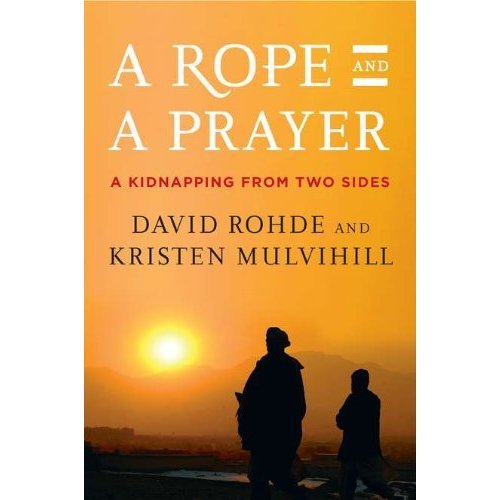David Rohde is a Pulitzer-Prize winning correspondent for the New York Times who, in November 2008, took leave from the Times to research a book about the war in Afghanistan.
Based in Kabul, he learns via a trusted translator that a Taliban commander three hours south of the city has agreed to be interviewed.
Rohde hesitates.
“I knew meeting with the Taliban was perilous,” he writes in the opening chapter of “A Rope and a Prayer: A Kidnapping From Two Sides.” Several of Rohde’s colleagues were kidnapped by the Taliban after responding to phony interview invitations.
Adding to Rohde’s caution was his marriage of two months to Kristen Mulvihill, a magazine photo editor who worked in New York City. Their plan was to settle in the States and have children as soon as the book was complete.
But in a rash decision he regretted thousands of times during the next seven months, Rohde set out for the interview. Accompanying him was an Afghan journalist and translator named Tahir and their driver, Asaad Mangal.
“I tell myself not to be a coward, that the interview is a risk worth taking,” Rhode writes, defining his mindset at the time. “Many other journalists have done the same thing.”
But at their meeting place outside a rural town, two men with Kalashnikov assault rifles rush toward their car shouting in Pashto dialect. Behind them, a vehicle blocks the road. The journalist and his companions are thrown in the back of their own car, now driven by a burly man and his rifle-toting companion.
From the back of the car, Rohde tells his captors he’s an American. The response from the driver, translated by Tahir, is terrifying: “We are going to send a blood message to Obama.”
Thus begins the harrowing, seven-month captivity of Rohde and his companions. Their captors demand $5 million in ransom and release of a half dozen Taliban prisoners in exchange for their freedom.
Complicating matters is the fact that the U.S. government will not release prisoners in a ransom situation, or fork over bribery money. And there’s no way Rohde and Mulvihill can come up with $5 million.
“A Rope and a Prayer” is a fascinating read from beginning to end, and provides extra insight because it’s co-authored by Mulvihill. Her chapters shed light on a monumental effort back home to free the captives. Always in the thick of it, Mulvihill is a crucial part of a home team consisting of the New York Times legal council, the FBI and an Irish National with Taliban contacts, among others.
More than once, Mulvihill, who turns 40 while her husband is in captivity, negotiates directly with the kidnappers via midnight phone calls from the Taliban. Eventually, she manages to arrange a meeting with Sen. Hillary Clinton (whom she likes) and gets the ear of Gen. David Petraeus and author and diplomat Richard Holbrooke.
For Maine readers, “A Rope and a Prayer” has extra interest because Maine is very familiar to the authors. Rohde moved to Maine when he was 14. He graduated from Fryeburg Academy in 1985 and went on to attend Bates College. Two months before the kidnapping, Mulvihill and Rohde married in a wooden chapel at Biddeford Pool.
At one point in the book, Mulvihill writes of the many things she and her husband have in common, among them, “a mutual connection to Maine.”
“By coincidence,” she writes, “his father lives twenty minutes from my parents. We each treasured our fond memories of spending time there.”
Meanwhile, events go from bad to worse in captivity. Rohde and his assistants are force-marched at night from Afghanistan to a part of Pakistan under control of a fanatical Taliban faction known as the Haqqani.
Haqqani hatred of the U.S., Europe and Israel is intense and founded partly on misconceptions. But, writes Rohde, some of their hatred is a consequence of Washington’s anti-terrorism policy.
“When I tell them I am an innocent civilian who should be released,” he writes, “they respond that the United States has held Muslims in secret detention camps for years. Why, they ask, should they treat me differently?”
In the end, it isn’t Washington or valiant efforts of his family that gain Rohde’s freedom. It’s a daring on-foot escape that, against all odds, succeeds.
“A Rope and a Prayer” is a true-life adventure story that shows the incredible persistence of two people half a world apart. It also provides insight into the Taliban mindset, and shows why we’re so hated in much of the Mideast.
Lloyd Ferriss is a writer and photographer who lives in Richmond.
Copy the Story Link
Send questions/comments to the editors.



Success. Please wait for the page to reload. If the page does not reload within 5 seconds, please refresh the page.
Enter your email and password to access comments.
Hi, to comment on stories you must . This profile is in addition to your subscription and website login.
Already have a commenting profile? .
Invalid username/password.
Please check your email to confirm and complete your registration.
Only subscribers are eligible to post comments. Please subscribe or login first for digital access. Here’s why.
Use the form below to reset your password. When you've submitted your account email, we will send an email with a reset code.